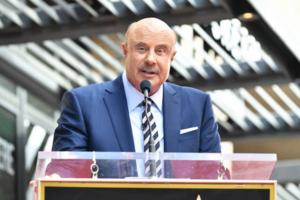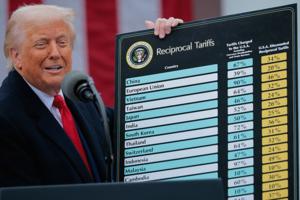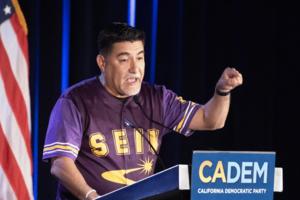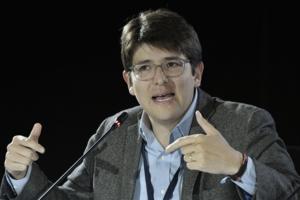Current News
/ArcaMax

Russia Unleashes Massive Drone Attack on Kyiv and Odesa, Kills 1
Russia unleashed a sweeping drone attack on the Ukrainian capital of Kyiv and the Black Sea city of Odesa that left a trail of destruction and killed at least one person, local authorities said.
In addition to the death, another three people were hospitalized in Odesa after a Russian drone hit an apartment building, Mayor Hennadiy Trukhanov ...Read more

California asks court to halt Trump deploying military in LA
California asked a federal court to halt the Trump administration’s “illegal” deployment of the state’s National Guard and the U.S. Marines in Los Angeles to quell unrest over the president’s immigration raids.
The move to block the administration from mobilizing thousands of troops follows tensions over anti-deportation protests. ...Read more
Baltimore teacher sues Libs of TikTok, Moms for Liberty, Maryland delegates over social media posts
A contentious back-and-forth online between a Baltimore-area teacher and a Moms for Liberty leader has sparked a defamation lawsuit.
In the filing, Alexa Sciuto, an educator who creates satirical social media posts on issues like LGBTQ rights and book bans, accuses a group of Republican state delegates and advocates of conspiring to derail her ...Read more

Two-plus years after being convicted of killing her children, Lori Daybell files appeal in Idaho
BOISE, Idaho — Lori Vallow Daybell’s appeal has been filed in Idaho after she was convicted in May 2023 of murdering her two children, Tylee Ryan and Joshua “JJ” Vallow, and conspiring to kill Tammy Daybell, the former wife of her husband, Chad Daybell.
Craig Durham, Daybell’s appellate attorney, filed the opening brief on May 30. He ...Read more

No, Dr. Phil wasn't present at L.A. ICE raids, but he taped interview with Trump's border adviser
LOS ANGELES — As Immigration and Customs Enforcement carries out raids across Los Angeles, former daytime talk show host Dr. Phil McGraw and his TV network MeritTV are covering the actions and protests in the city.
McGraw conducted an interview Friday with White House border adviser Tom Homan, who was leading the agency's raids. A portion ...Read more

Protests against ICE ramp up in Baltimore after unrest in LA
Benches at McKeldin Square were filled Monday as community organizers protested anti-immigrant speech from politicians and ICE deportations — rhetoric that’s flooded social media as tensions increased between progressive activist groups and federal agents after recent Los Angeles protests became violent over the weekend.
One speaker said ...Read more

Protesters rage at ICE arrests amid heavy police presence at Foley Square in lower Manhattan
Hundreds of protesters swarmed into lower Manhattan Monday evening to decry the mass arrests of detainees by Immigration and Customs Enforcement.
Around 200 demonstrators gathered for an “ICE out of NYC” protest near Foley Square around 5 p.m., steps away from an ICE facility at 26 Federal Plaza where an unknown number of detainees are ...Read more

US deploys Marines to LA as Trump tensions with Newsom intensify
The Trump administration escalated its response to anti-deportation protests in Los Angeles with the mobilization of 700 Marines, deploying active-duty military on the ground and deepening tensions with California officials.
The move came after a day of intensifying clashes between President Donald Trump and Governor Gavin Newsom, with ...Read more

Resolution introduced by Rep. Gabe Evans condemning antisemitic attack in Boulder passes in U.S. House
The U.S. House on Monday passed a resolution introduced by Republican U.S. Rep. Gabe Evans that condemns the June 1 antisemitic attack on Boulder’s Pearl Street Mall by an Egyptian national who was in the country illegally.
Evans, who represents Colorado’s competitive 8th Congressional District, criticized the state’s “radical leftist ...Read more

US asks appeals court to let Trump tariffs remain for longer
WASHINGTON — A federal appeals court is closer to ruling on whether to keep most of President Donald Trump’s global tariffs in place longer while the legal battle over them continues.
The Justice Department on Monday asked the U.S. Court of Appeals for the Federal Circuit to extend its earlier short-term pause on a lower court’s May 28 ...Read more

Union members rally to support California leader arrested during ICE protests
Organized labor joined California politicians on Monday in accusing the White House of manufacturing a political conflict to suppress protests against the Trump administration’s immigration crackdown.
Members of Service Employees International Union rallied nationwide Monday afternoon in support of SEIU California President David Huerta, who ...Read more

US deploys Marines to LA as Trump tensions with Newsom intensify
The Trump administration escalated its response to anti-deportation protests in Los Angeles with the mobilization of 700 Marines, deploying active-duty military on the ground and deepening tensions with California officials.
The move came after a day of intensifying clashes between President Donald Trump and Gov. Gavin Newsom, with California ...Read more

Protesters rage at ICE arrests amid heavy police presence at Foley Square in lower Manhattan
NEW YORK — Hundreds of protesters swarmed into lower Manhattan Monday evening to decry the mass arrests of detainees by Immigration and Customs Enforcement.
Around 200 demonstrators gathered for an “ICE out of NYC” protest near Foley Square around 5 p.m., steps away from an ICE facility at 26 Federal Plaza where an unknown number of ...Read more

LA immigration raids draw California Gov. Gavin Newsom back into the fight with Trump
SACRAMENTO, Calif. — Gov. Gavin Newsom resisted a fight with President Donald Trump over transgender youth in women's sports. He forced his way onto a runway tarmac to make peace with the Republican leader after the Los Angeles wildfires.
Just last week, he hesitated before speaking out when rumors swirled about a massive federal funding cut ...Read more

Hundreds gather in San Jose, Oakland to protest ICE
SAN JOSE — Hundreds of people gathered Monday evening in San Jose and Oakland to protest U.S. Immigration and Customs Enforcement and stand in solidarity with protesters in Southern California.
The demonstrations followed massive protests against ICE that erupted across Los Angeles over the weekend. On Saturday, President Donald Trump ...Read more

Michigan State Police troopers vote 'no confidence' in leadership; Gov. Whitmer voices support for appointee
LANSING, Mich. — Most Michigan State Police troopers voiced a lack of confidence in state police leadership in a recent internal poll of membership, prompting calls for them to resign from Michigan State Police Troopers Association, the MSP's Command Officers Association and Republican lawmakers.
The poll, conducted between June 2 and June 6,...Read more

Got water rights? Nevada wants to buy them but doesn't have the money
LAS VEGAS — The driest state in the nation will create a program to buy back water rights and permanently retire them, but questions remain about where the money for it will come from.
Gov. Joe Lombardo, a Republican, signed Assembly Bill 104 and Senate Bill 36 last week. The companion bills only create the voluntary groundwater rights ...Read more
News briefs
Deterrence and intimidation drive Trump threats to arrest Newsom in LA standoff
WASHINGTON — President Donald Trump’s late-night phone call with Gov. Gavin Newsom on Friday night came with a warning. Protests against immigration raids in Los Angeles were producing flares of unrest. “Get the police in gear,” Trump told the governor.
...Read more

Senator shot in head 'needs a miracle' as Colombia reels
Last Thursday, presidential hopeful Miguel Uribe Turbay warned that Colombia was fast sinking back into its violent past. Two days later, a gunman shot him in the head during a rally.
The 39-year-old opposition senator now “needs a miracle”, his wife said in a social media post on Monday, urging people to pray for him as he fights for life ...Read more

Law enforcement makes 74 arrests at LA protests over the weekend
LOS ANGELES — Law enforcement arrested at least 74 people on suspicion of vandalism, looting, violence and more during the Los Angeles protests over the weekend, authorities said.
The Los Angeles Police Department arrested 29 protesters for allegedly failing to disperse at demonstrations Saturday night. The department then arrested an ...Read more
Popular Stories
- Mexican president condemns LA violence, calls on Mexicans to act peacefully
- Manhunt for Washington father being led by feds; autopsies show how 3 daughters died
- Home Depot caught in the crosshairs of LA immigration raids
- Two killed in livestreamed shooting in front of Bellagio fountains
- Downtown LA hit by widespread vandalism, damage as city struggles to calm unrest





